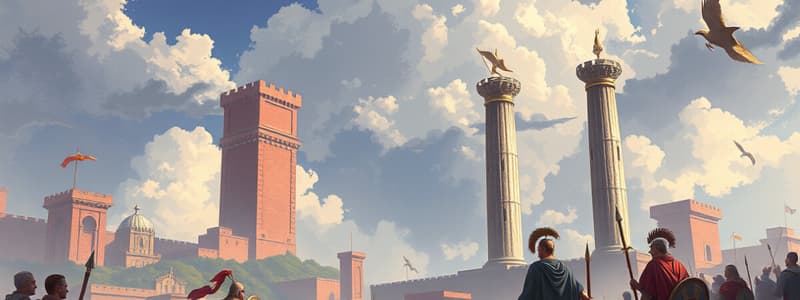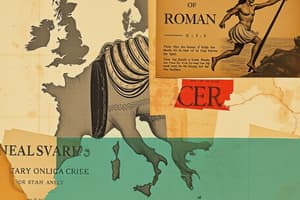Podcast
Questions and Answers
What term refers to the common folk in the Roman Republic?
What term refers to the common folk in the Roman Republic?
- Patricians
- Plebicians
- Sovereignty
- Plebiscite (correct)
Which concept is described as the control of one nation over foreign lands?
Which concept is described as the control of one nation over foreign lands?
- Feudalism
- Mercantilism
- Colonialism (correct)
- Divine right of Kings
Who is known for advocating reason, science, and religious freedom during the Enlightenment?
Who is known for advocating reason, science, and religious freedom during the Enlightenment?
- Francois-Marie Arouet (Voltaire) (correct)
- John Locke
- Thomas Hobbes
- William Blackstone
What theory emphasizes the importance of wealth accumulation for the monarchy and nation?
What theory emphasizes the importance of wealth accumulation for the monarchy and nation?
Which concept describes the belief that a government has the right to make public policy?
Which concept describes the belief that a government has the right to make public policy?
Flashcards are hidden until you start studying
Study Notes
Social Classes in Ancient Rome
- Patricians: Wealthy upper class, consisting of landowning aristocrats who held political power in the Roman Republic.
- Plebeians: Common people of the Roman Republic, had limited rights compared to the patricians but gradually gained more political influence.
Political Concepts
- Feudalism: A hierarchical system for land management where powerful lords allocate land to lesser lords in exchange for loyalty and military service.
- Sovereignty: An unwritten rule within Congress that assigns leadership roles (such as committee chairmanship) based on seniority and length of service.
- Legitimacy: The general belief that a government possesses the right to create and enforce public policies, essential for political stability.
- Divine right of Kings: A doctrine asserting that monarchs derive their authority directly from God, legitimizing their rule.
Economic Theories
- Colonialism: The practice of one nation exerting control over foreign territories, often for resource acquisition and economic gain.
- Mercantilism: An economic theory prioritizing the accumulation of monetary wealth as a source of national power, emphasizing government regulation of the economy to achieve favorable trade balances.
Enlightenment Thinkers
- Francois-Marie Arouet (Voltaire): Influential Enlightenment philosopher advocating for reason, religious freedom, and scientific thought; known for extensive works across multiple genres, often while in exile from France.
- William Blackstone: Notable English judge who authored a foundational series on English law, significantly influencing American legal thinking, particularly in the Declaration of Independence and Constitution protecting individual rights.
Studying That Suits You
Use AI to generate personalized quizzes and flashcards to suit your learning preferences.




